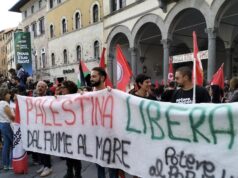By Leo Vinicius
Cesare Battisti is a militant of the 1970s Italian extra-parliamentary left, having been a member of Armed Proletarians for Communism. Along with many other activists of the period he fled Italy to avoid the wave of repression which closed the decade, and now has a precarious political refugee status in Brazil, as the Italian state continues to seek his extradition.
1. On the hunt for dissidence: from Negri to Battisti, two examples representing many
In the class struggle victory is never final, no matter for which side. The struggle is ongoing. It is continuous and does not respect national borders, and the case of Cesare Battisti [1] shows us this once more. The defeat of the social movements and extra-parliamentary left in Italy would not have been decisive – and it happened for this very reason – until Cesare Battisti fell victim to the Italian State’s and bourgeoisie’s desire to incarcerate him.
It was Antonio Negri who was the most “illustrious” wanted man and political prisoner falling victim to the repression in Italy, which principally came into effect in the late 1970s [2]. During this cycle of state repression, with the significant active support of the Italian Communist Party, 60,000 people were arrested and 6,400 imprisoned. Around 200 activists were still in prison at the end of the 90s, and 180 were in exile.
On 7th April 1979 seventy people, including Toni Negri and colleagues who lectured with him in the Political Sciences department of Padua University, were placed under “protective custody” – which, according to emergency legislation, could last up to eleven years and eight months. They were considered by the authorities of repression to be the intellectual leadership of an autonomist movement which had the Red Brigades as its armed wing. Two days later Negri would be accused by the state prosecutor of the murder of Aldo Moro, the main leader of the Christian Democrat Party, Italy’s largest party, who had the previous year had been kidnapped and murdered by the Red Brigades. Between then and the end of 1979 the state imputed to him the moral or material responsibility for seventeen murders, among other accusations. His texts – now almost classics – such as Domination and Sabotage, Crisis of the Planner-State, Workers’ Party against Work and Workers and the State were cited in judicial decisions to keep him locked up.
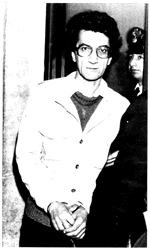
Over the four years in which Negri was subject to protective custody the accusations were modified as the previous ones fell by the ways side, showing that what was always most important was to hold him prisoner, no matter how illegally. Unheard-of accusations, for example that he was leader of the Red Brigades and participated in the murder of Aldo Moro – when in fact Negri had written critiques of the RBs and would be condemned by the latter for doing so later – were rebutted with “evidence” such as the voice analysis of a phonology institute in Michigan which recognised the voice of the kidnapper who phoned Moro’s family as belonging to Negri, or identification-by-witnesses. “Evidence” of Negri’s direct participation in murders was “obtained” by paying people to testify against him, a product of the special legislation as used against Cesare Battisti and so many others. This mass of accusations, “evidence” and “proofs” against Negri should be considered, particularly today, as completely absurd and almost laughable, but also must serve to stop history repeating what happened with Cesare Battisti and other political prisoners, and crush any illusions in the supposed “legitimacy” and political neutrality of the trials to which they were subjected. Thirty years later, the witch-hunt, the laws, the trials and the sentences which sought indiscriminately to lock away the militancy of groups and social movements under the banner of fighting terrorism (ah, the old slogan, always at hand when necessary!) is already in the history books [3]. For the bourgeois press and those sympathetic to the late PCI (for example Mino Carta) it is necessary to tell the tale that this historiography does not exist, that cases such as that of Toni Negri – an intellectual locked up, condemned and accused of all sorts of crimes – did not happen, and that Amnesty International’s reports on the torture, trials and special laws in Italy in the 80s never existed, in order to be able to cynically defend the extradition of Battisti and his indefinite imprisonment – with no sunlight – on the basis of the impartiality of the Italian courts.
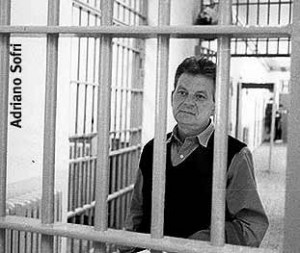
In order to get out of the protective custody to which he was subject for four years, Negri was elected as an MP for the Radical Party. However this parliamentary immunity was removed by MPs themselves (including some MPs from the Radical Party itself). Negri then fled to France. His trial, coincidentally enough, only began after he fled. He returned to Italy in 1997, carrying out the rest of his sentence in an attempt to bring attention to the hundreds of militants who were still in prison or exile on account of political infractions and political trials, many of them manipulated. Such was the case of Adriano Sofri [4], a leader of the biggest extra-parliamentary left group of the 70s, Lotta Continua, which had tens of thousands of members and a daily paper – of the same name – with a circulation of 50,000. As the historian Carlo Ginzburg tried to show, prosecutors and judges manipulated and distorted evidence, in particular the deployment of a “repentant” (as those who gave paid testimonies were labelled) Leonardo Marino, such as to ensure that Sofri was found guilty as an accomplice to murder [5]. Adriano Sofri was sentenced to 22 years imprisonment in 1997. He insisted upon his innocence, refusing to accept guild in exchange for a reduced sentence.
2. Negri on contemporary events
 Goodbye Mr. Socialism consists of an 2006 interview which Raf Valvola Scelsi conducted with Antonio Negri. Don’t be fooled – the “socialism” to which Negri says goodbye is “actually existing socialism” as well as that of electoral parties, which we might call the social democracy. With this clarified, we can see this is very probably the best interview with Negri of this decade in terms of the issues tackled and the relatively current events covered, which allows Negri’s typically too-abstract conceptual framework to gain more concreteness, and thus it is easier to understand and take in. It is however recommendable not only for those who want to introduce themselves to the writer’s thought, but also for those who want to better understand the concepts discovered in Empire, Multitudes and other works of philosophy.
Goodbye Mr. Socialism consists of an 2006 interview which Raf Valvola Scelsi conducted with Antonio Negri. Don’t be fooled – the “socialism” to which Negri says goodbye is “actually existing socialism” as well as that of electoral parties, which we might call the social democracy. With this clarified, we can see this is very probably the best interview with Negri of this decade in terms of the issues tackled and the relatively current events covered, which allows Negri’s typically too-abstract conceptual framework to gain more concreteness, and thus it is easier to understand and take in. It is however recommendable not only for those who want to introduce themselves to the writer’s thought, but also for those who want to better understand the concepts discovered in Empire, Multitudes and other works of philosophy.
The multitude, the commons, the centrality of mental labour and the basic income are some of the concepts which permeate the conversation with Scelsi, separated into chapters which go from the Zapatista uprising to the demonstrations/movements in Seattle and Genoa, to the May Day protests of casual workers in Europe, to Iran, Iraq, China, Berlusconi’s Italy and Lula’s Latin America, among other themes and events analysed. In the chapter on Lula he gives an impression which is not so idyllic for the Brazilian reader: Lula, the president who governs with the social movements. But there are other more interesting and convincing arguments in the book…
According to Negri, for the multitude and for the precarious, the metropolis represents what the factory did for the working class. Therefore there is a need to move from certain forms of struggle linked to the factory, such as pay and the relationship between trade union and management, to forms of struggle linked to citizenship and what he calls rhythms of bio-political disenfranchisement. For the philosopher of “optimism of the intellect” [6] forms of struggle such as those used by the banlieusards in France – the ‘nomads’ on the periphery who in October and November 2005 revolted, burning thousands of cars, amongst other things – are analogous to those of the Luddites in the factories who preceded the formation of the organised working class: struggles of sabotage and breaking communications. But “optimism of the intellect” often doesn’t match with reality. Looking back in hindsight Negri admits that the interpretation he and his comrades made of the public sector strikes that exploded in France in late 1995, as the first moment of struggle constituting the commons (a concept of the public, excluding the state) was in reality shown later to be still the same as workplace struggles.
We can see some truth in the statement – made at the end of the book – that the struggles of the precarious in the metropolitan centres can spread if they are directed at public services. This is because it is difficult to determine a common wage demand and easier to think of a series of rights linked to health, culture, education etc., as the author argues.
3. Wu Ming 1, on stories past and present
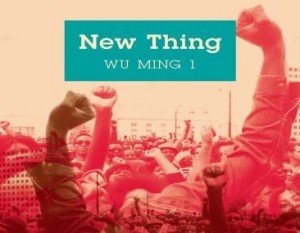 New Thing is a political-police novel, the sole work of Wu Ming 1, a member of the Wu Ming collective. It is a collective composed of five Italian writers (named successively as Wu Ming 1, Wu Ming 2…). The two first novels written by this collective, 54 and Q (the latter under the nom de plume Luther Blissett) became best-sellers acclaimed by critics in various European countries.
New Thing is a political-police novel, the sole work of Wu Ming 1, a member of the Wu Ming collective. It is a collective composed of five Italian writers (named successively as Wu Ming 1, Wu Ming 2…). The two first novels written by this collective, 54 and Q (the latter under the nom de plume Luther Blissett) became best-sellers acclaimed by critics in various European countries.

The story starts out with a series of murders of black jazz musicians in 1960s New York. The backdrop is the civil rights struggles which spread across the country, and the thriving free jazz scene (a new thing). New Thing introduces a new style of narrative fiction, with the story related by the characters, who in turn give shape to – and explanation of – the story, as if making a documentary. The sources of inspiration of the book, particularly in terms of its form, are explained in the epilogue, which also clarifies what is fiction and what is real history in the book. New Thing is highly recommendable reading: enjoyable, intelligent and political. Perhaps the most political aspect, characteristic of the writings of Wu Ming, is the attempt to present diverse movements, revolts and insurrections separate in time and place as part of a single more general struggle of the multitude and the oppressed against the established powers. New Thing is no different. It is a thread running through the works of Wu Ming. Throughout their writings they seek to bring together these apparently historically separate struggles and show that our struggle today is their heritage and continuation. In a certain sense this is what Antonio Negri is also trying to do in his philosophy and sociology in Insurgencies: Constituent Power and the Modern State. Wu Ming tries to represent our history as the history of past struggles, making us understand past struggles – or better still, help us recognise that past struggles are the history of our own struggles – so that we might take something from them, feeding a challenging imagination and strengthening something symbolic which enriches our struggles today.
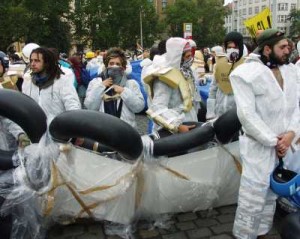
The members of Wu Ming were part of the Tute Bianche, the best-known Italian section of the so-called “anti-globalisation movement”. Like the great majority of the other Tute Bianche militants, they developed politically by means of the Social Centres – places which kept alive the defeated Italian autonomist movement of the 1970s, as Negri himself says. Influenced by the Zapatistas and claiming the tradition of the 1970s autonomist movement, it can be said that they are the legitimate heirs of the movement in which Toni Negri and Cesare Battisti took part. In 2004, when Battisti’s extradition from France was being discussed, Wu Ming 1 produced an excellent article which, amidst other analysis, told the story of some of the special laws which helped the imprisonment and sentencing of many militants [7].
4. Free Cesare
In 1980, in an interview for Le Monde, Michel Foucault said ironically, “In truth we do not live under a regime where intellectuals are sent to the rice fields. But have you heard talk of such treatment for Toni Negri? Is he not in prison simply for being an intellectual?” Foucault was partly right. But surely in this case imprisonment was the consequence of belonging to the autonomist left, whether as a thinker and/or militant? Cases such as those of Negri, Sofri, Battisti and so many others give some credibility to Proudhon’s old argument that socialism is the negation of the law and of the courts, stating “When the judge sentences the accused citizen – following the law – for revolutionary ideas, writings or words spoken, it is no longer a defendant he is striking against, but an enemy”. Whatever role it has played in social struggles and popular movements, it is in the practical sphere that we can see that judicial power is a class power – this class analysis is what Gilmar Mendes [President of Brazil’s Federal Supreme Court], currently in the vanguard of Brazilian right wing politics, called “upstart sociology”.
The mobilisation of the Italian and Brazilian bourgeoisie and right-wing for the extradition of Battisti is no small thing. The proof of this is that having received the status of political refugee from the Ministry of Justice, his case has still not found solution, as occurred for other people. There are clear indications that the right is arguing for the reinterpretation of laws, the creation of new jurisprudence and for all to be done to extradite him – bringing to mind the breaking of Negri’s parliamentary immunity in 1983. Battisti, an ex-militant like thousands of others, is on the receiving end of international class hatred, perhaps in part for having denounced the persecution in Italy and for continuing to be a communist. All this hatred and persecution makes us think that he is not fully safe even as a refugee outside Italy. It is possible that again he will be given protection. In comparison to the strength of the ruling classes, the forces supporting Battisti are basically limited to certain heroic and dedicated individuals, young people put to work by left movements and parties, when we know that the strength of those ‘below’ comes principally from mobilisation and more direct collective action.
Certainly we are experiencing a time of retreat of social movements and socialists, in Brazil as much as in Italy. But perhaps that also relates to a difficulty we now have in linking past struggles to those of today, recognising ourselves in those struggles, and drawing the lines which unite struggles and ideas across space and time. There are signs of victory for the class enemy, but what is certain is that it is not decisive. Battisti is here to prove it, in his current position as political refugee and in the fight, which must be won, to keep him in Brazil and at liberty. With this understanding in mind, the works of Negri and Wu Ming 1 have fresh meaning.
Notes
[1] For Cesare Battisti’s case, see www.cesarelivre.org
[2] For Negri’s case, but also for a relation of the political-judicial persecution in Italy with references, see the editor’s introduction to Antonio Negri’s Books for Burning (New York: Verso, 2005). You can see the book on Google Books, where the editor’s introduction appears in full.
[3] For more background see Paul Ginsborg, A History of Contemporary Italy: Society and Politics 1943 – 1988. New York: Penguin, 1990.
[4] On the case of Adriano Sofri, see http://en.wikipedia.org/wiki/Adriano_Sofri; and http://www.dougdowd.org/NewFiles/articles/sofrihi.html
[5] See Carlo Ginzburg’s The Judgment and the Historian: Marginal Notes on a Late Twentieth-Century Miscarriage of Justice. New York: Verso, 1999.
[6] Negri inverted Gramsci’s formula “pessimism of the intellect, optimism of the will”. This inversion, besides being coined by Negri, is also implied in his own theory.
[7] In Italian: Cesare Battisti: quello che i media non dicono http://www.wumingfoundation.com/italiano/outtakes/cesare_battisti_2.htm. Thiscan also be read in French: Cesare Battisti ce que les médias ne disent pás http://www.wumingfoundation.com/italiano/outtakes/cesare_battisti_2_french.html. Also see Wu Ming 1′s, Cesare Battisti e le libertà in Itália http://www.wumingfoundation.com/italiano/outtakes/cesare_battisti.html
Translated by The Commune. Original at http://passapalavra.info/2009/02/1118.



